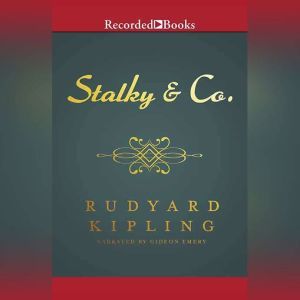

Stalky and Co.
Author: Rudyard Kipling
Narrator: Gideon Emery
Unabridged: 6 hr 58 min
Format: Digital Audiobook Download
Publisher: Recorded Books
Published: 11/13/2015


Author: Rudyard Kipling
Narrator: Gideon Emery
Unabridged: 6 hr 58 min
Format: Digital Audiobook Download
Publisher: Recorded Books
Published: 11/13/2015
Short-story writer, novelist, and poet Rudyard Kipling was the first Englishman to receive the Nobel Prize for Literature and was hailed as a literary heir to Charles Dickens. His most popular works include The Jungle Books, Kim, and "The Man Who Would Be King." Audiences love his romantic tales about the adventures of Englishmen in strange and distant parts of the world. Characteristic of Kipling is sympathy for the children's world, a satirical attitude toward pompous patriotism, and belief in the blessings and superiority of the British rule. Although he was widely regarded as Britain's unofficial poet laureate, Kipling refused the honor, as well as the Order of Merit.
Kipling was born in 1865 in British-ruled Bombay, India, where his father was an arts and crafts teacher. At age six, he was put in a London foster home, and it was here that he began writing, influenced by his pre-Raphaelite ancestors. When Kipling was thirteen, he entered United Services College, an expensive military boarding school. His poor eyesight and mediocre grades ended his hopes for a military career. These years are recalled in a lighter tone in his book Stalky & Co.
Kipling returned to India in 1882, where he worked as a journalist, an assistant editor, and an overseas correspondent. Seven years later, Kipling moved back to London and married Caroline Starr Balestier, the sister of an American publisher and writer. They moved to the United States but, dissatisfied with life in Vermont and distraught by the death of his daughter, Kipling moved his family back to England. Still restless, he poured his energy into writing and produced The Jungle Books.
During the Boer War, Kipling spent several months in South Africa. In 1901, he published Kim, which is widely considered his best novel. Kipling received the Nobel for Prize for Literature in 1907. The prestigious prize was awarded for his power of observation, originality of imagination, virility of ideas, and remarkable talent for narration. Kipling died on January 18, 1936, in London.
Some critical review comments from the Kipling Society website. ‘An unpleasant book about unpleasant boys at an unpleasant school’ `little beasts’ `a more odious picture of school life can seldom have been drawn’ Read this book to my Dad over a few weeks. It was one of his favourites. I have to say I......more
A book about youngsters, but NOT a book for youngsters, mainly for its philosophy, too deep for someone under at least 40 years. And one big question: who is changing? People, times or perhaps both of them? That's because one hundred (and more in fact) years ago we had schools only for the rich ones......more
Originally published on my blog here in July 2001. Few of Kipling's fictional stories contain much of an autobiographical element, despite his frequent use of the first person. In this collection of stories, the school and some of the characters are based on his own experiences; Beetle, in particular......more